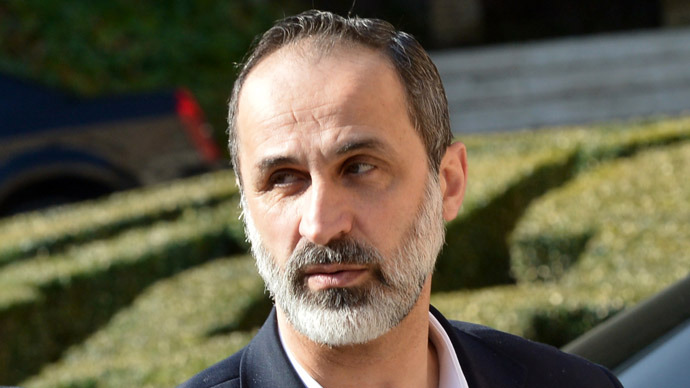Syrian opposition leader resigns “to be able to work with freedom that cannot be available within the official institutions.”
Published : March 24, 2013 http://rt.com/news/snc-president-katib-resigns-748/

Ahmed Moaz Khatib (AFP Photo/Alberto Pizzoli)
The head of the Western-backed opposition group has stepped down amid high tension in the coalition. He said in a statement that he is resigning “to be able to work with freedom that cannot be available within the official institutions.”
“I had promised the great Syrian people and promised God that I would resign if matters reached some red lines. Now I am fulfilling my promise,” the statement on Khatib’s Facebook page says.
However, hours after the announcement was made the Syrian National Coalition released a statement saying the opposition bloc has refused the resignation of its leader al-Khatib.
“They are asking Mr. Moaz al-Khatib to go back to his work as the president of the Coalition,” the statement said.
“They are asking Mr. Moaz al-Khatib to go back to his work as the president of the Coalition,” the statement said.
The Turkey-based Syrian National Coalition (SNC) has been rife with internal fighting among its various factions. Lately the body has been struggling to form an interim government, which would serve as replacement for the current government of Syrian President Bashar Assad in the event of an overthrow or resignation.
The SNC managed to elect Ghassan Hitto as prime minister of the provisional government, but his candidacy sparked protest from some members of the coalition. At least 12 members of the council resigned following the election, which ground the process of forming the cabinet to a halt.
Syria's main armed opposition group, the Free Syrian Army, refuses to recognize Hitto as prime minister.
"We in the Free Syrian Army do not recognize Ghassan Hitto as prime minister because the (main opposition) National Coalition did not reach a consensus," at the March 18 vote, FSA political and media coordinator, Louay Muqdad, told AFP.
"I speak on behalf of the [rebel] military councils and the Chief of Staff when I say that we cannot recognize a prime minister who was forced on the National Coalition, rather than chosen by consensus,"he added.
Muqdad called on Coalition members to "make right what was wrong."
Members of the Coalition have been disagreeing on other important issues, including whether or not they should negotiate a political solution of the Syrian crisis with Assad’s government, and who should be on their negotiators’ team.
To some, such internal divisions are to be expected when seen in the light of wider developments. Journalist and political commentator Alaa Ibrahim believes a major reason for al-Khatib’s resignation was because of the uncontrollable bloodshed in the country and that many opposition factions seem to acting independently.
But the reasons for such behavior by the different sectors of the opposition are no surprise to Ibrahim, when the rebels’ foreign backers are themselves at odds with each other at times, which as Ibrahim expressed means “we see more disagreement. Often we’ve seen the US would like to advance a political solution at some point, to be contradicted by the United Kingdom and France, as we’ve seen recently the weapons embargo regarding sending weapons from the EU to Syria. The UK and France were acting in complete disengagement with what the US was at least declaring it wants to do (of course that position changed afterwards). So, everyone knows some of the external opposition operating abroad is directly linked to Western powers – and regional powers also – and they will act accordingly.”
But the reasons for such behavior by the different sectors of the opposition are no surprise to Ibrahim, when the rebels’ foreign backers are themselves at odds with each other at times, which as Ibrahim expressed means “we see more disagreement. Often we’ve seen the US would like to advance a political solution at some point, to be contradicted by the United Kingdom and France, as we’ve seen recently the weapons embargo regarding sending weapons from the EU to Syria. The UK and France were acting in complete disengagement with what the US was at least declaring it wants to do (of course that position changed afterwards). So, everyone knows some of the external opposition operating abroad is directly linked to Western powers – and regional powers also – and they will act accordingly.”
The resignation was announced just after the SNC was invited to attend an Arab League summit. Both Khatib and Hitto were expected at the event in Qatar’s capital, Doha. The League was anticipating formation of the provisional government by the coalition with the intention to give it Syria’s seat in the organization.
The Arab League suspended Syria’s membership in November 2011 as Damascus rejected demands that President Assad step down. The Syrian government accuses some members of the league, including Saudi Arabia and Qatar, of waging a proxy war against it by supplying arms and paying militants fighting in Syria.